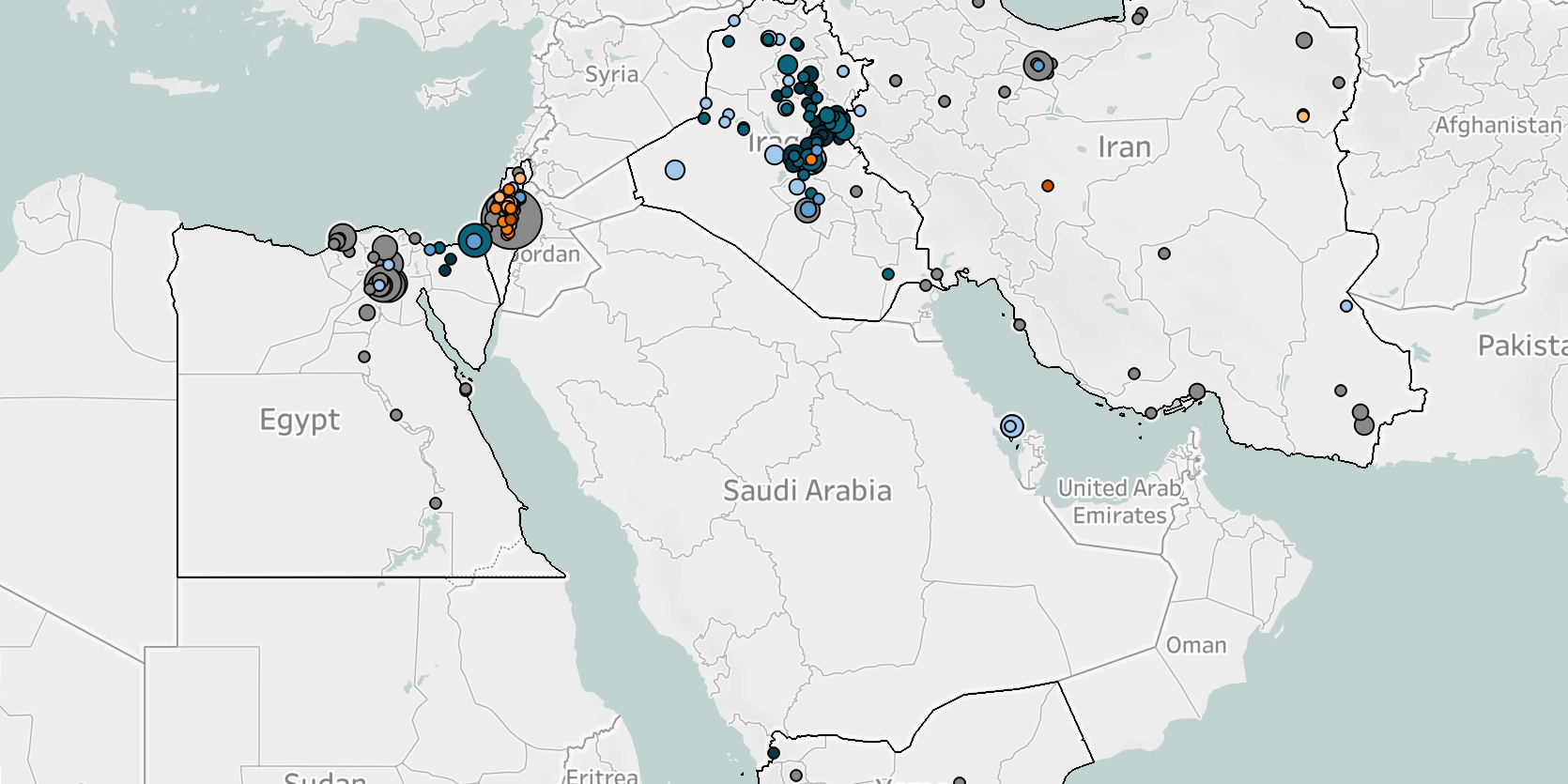Last week in North Africa and the Middle East, new leadership came to power Israel and Iran. In Iran, its effects are yet to be seen, though in Israel, the new government’s approval of a right-wing march led to heightened tensions in the West Bank, Gaza, and East Jerusalem. In Egypt, the government continued its campaign targeting the outlawed Muslim Brotherhood (MB), as the death sentences of 12 prominent MB leaders were upheld by Egypt’s highest court. In Bahrain, the death of a political prisoner ignited protests and precipitated the summons of prominent Shiite religious leader Sayed Majeed Al-Mashaal by state security. Finally, in Yemen, pro-Houthi forces raided and shut down three Sunni Quran memorization centers and a mosque in Sanaa city.
In Israel, the news was largely dominated by the formation of a new Israeli government on 13 June. The eight-party coalition government led by Naftali Bennett of the nationalist right-wing Yamina party brings together religious, secular, nationalist, leftist, centrist, and, for the first time in decades, an Israeli Arab party (Al Jazeera, 14 June 2021). One of the first decisions taken by the coalition government was the approval of a Jewish nationalist Flag Day march in Jerusalem, in celebration of Israel’s capture of east Jerusalem in 1967 (Reuters, 14 June 2021). On 15 June, thousands of right-wing nationalists marched through parts of Jerusalem’s Old City, some of whom chanted “Death to Arabs” and other racist slogans (The Times of Israel, 15 June 2021). The march led to clashes with Palestinians, and the Haredi Jewish group Neturei Karta, who carried Palestinian flags, shouted slogans against Zionism, and burned an Israeli flag. Neturei Karta represents a small population of Haredi Judaism, and is known for its strong anti-Zionist stance. It is based on the belief that establishing a Jewish state until the coming of the Messiah is illegitimate and a religious offense (Al Monitor, 2 November 2015). Several hours after the march, Hamas launched many incendiary balloons towards Israeli settlements. Israeli forces responded with airstrikes targeting Hamas positions over the next few days.
In the West Bank and Gaza, following the Flag Day march, demonstrations denouncing the use of racist slurs led to clashes breaking out between Palestinians and Israeli police and military, as well as settlers. This rise in tensions signals the frailty of the state of ‘peace’ with which the new Israeli government must contend.
In Iran, a new president, Ebrahim Raisi, was elected on 18 June and will be inaugurated in early August. Raisi holds ultra-conservative views and a background as one of Iran’s top judges (Euronews, 20 June 2021). His election signals neither a big change in Iranian policy nor for political and religious freedom. Meanwhile, two Baha’i citizens were arrested in Shiraz, in continuation of the pressure campaign on Baha’is launched at the beginning of the Iranian new year in March.
Following the parliament’s approval of a law permitting the non-disciplinary dismissal of civil servants with proven links to the MB on 6 June, Egypt’s highest civilian court upheld the death sentences of 12 prominent MB members and leaders last week (Al Jazeera, 14 June 2021). The 12 men face execution, pending the approval of President Abdel Fattah el-Sisi. This ruling, which cannot be appealed against, marks the end of a trail linked to the dispersal of the 2013 Rab’a sit-in. Egyptian security forces allegedly killed at least 817 MB supporters who came for the sit-in in support of former President Mohamed Morsi (HRW, 12 August 2014). At least 450 others, alleged MB members or supporters, were also given prison terms of at least 10 years (Associated Press, 14 June 2021). Along with the passage of multiple parliamentary laws targeting the MB in the past year, the upholding of these sentences signifies the state’s all-encompassing strategy to stifle any activity by the MB or their supporters. Moreover, this strategy also targets political Islam more broadly, by going after the biggest and most effective group which had used it, to get to the highest positions of power.
Coptic Orthodox churches across Egypt announced the return of mass and other activities last week, following a noticeable decline in reported coronavirus cases (Egypt Independent, 13 June 2021). Church goers will continue to participate in mass and in evening prayers at an attendance of 25%, with a maximum of one person on each bench. Nevertheless, several dioceses — including those in Sohag, Assiut, and the Red Sea — announced that they would be holding celebrations for ‘Virgin Mary Day’ and other celebrations of Coptic Orthodox saints (Masrawy, 12 June 2021).
In Bahrain, the death of political prisoner Hussein Barakat led to protests. He died after contracting the coronavirus while serving a life sentence for allegedly joining the Zulfiqar Brigades, which is considered by the government to be a “terrorist group” (ADHRB, 10 June 2021). Dozens of activists participated in his funeral, including prominent Shiite imam and former head of the Ulama Islamic Council Sayed Majeed Al-Mashaal. NGOs and activists have accused the government of medical negligence in Barakat’s death (ADHRB, 10 June 2021). Bahraini security forces summoned dozens of activists and Al-Mashaal in an apparent response to the protests, though they cited coronavirus restrictions (Bahrain Mirror, 14 June 2021).
In Yemen, pro-Houthi forces targeted and shut down three Sunni Quran memorization centers and a mosque in Sanaa city last week (Al Mashhad Al Yemeni, 17 June 2021). While the reasons for these actions were not given by pro-Houthi forces, sources speculate that this could be a prelude to the seizure of these buildings (Aden al Ghad, 18 June 2021). Other sources suggest that pro-Houthi forces may be shutting these centers down in an effort to rally more people to attend their own summer schools (Al Mashhad Al Yemeni, 17 June 2021).
All ACLED-Religion pilot data are available for download through the ACLED-Religion export tool. Explore the latest data with the interactive ACLED-Religion dashboard.






